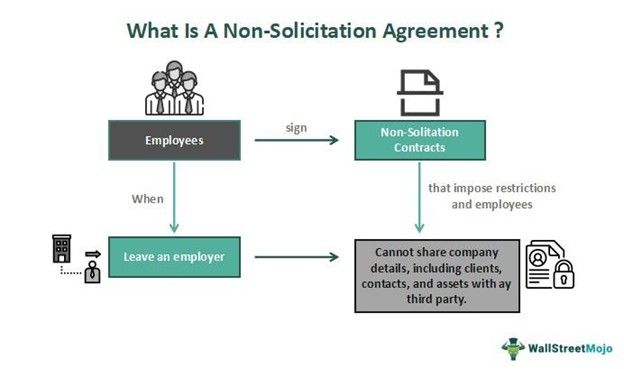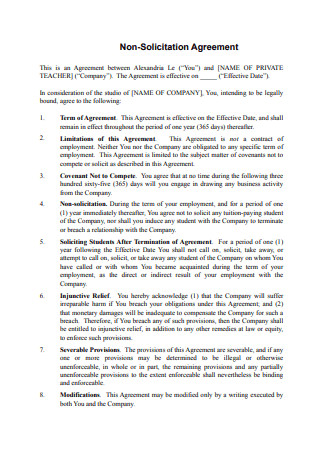Table of Contents
What Is A Non-Solicitation Agreement?
A Non-Solicitation Agreement is a legal document typically binding an employer and employee wherein the latter has no right to use any asset, data, report, contacts, or connections for personal interest and gain once they have left the company. It restricts former employees and can be a separate document or mentioned in the employment contract as a clause.

To solicit has a broad scope of meaning and application. In general, it refers to employees persuading clients to do business with a different company in competition with their present one. When found guilty of poaching clients, the employers can file a lawsuit against the employee and sue them for damages and loss under the non-solicitation agreement clauses.
Key Takeaways
- Non-solicitation agreements are legal documents restricting employees from using the company's client list and contacts after leaving the company.
- It is either a clause or a whole legal letter signed by the employee at the time of joining as a part of the appointment.
- The agreement mainly works in favor of employers to protect their clientele and other corporate assets from people who are no longer part of the organization.
- In some cases, new companies force employees to take advantage of previous company contacts to expand their business.
Non-Solicitation Agreement Explained
A non-solicitation agreement refers to the contract that employers introduce to employees, along with the appointment letter and employment contract. The agreement clearly states that after the termination of employment or in the event of the employees leaving the company, the employees in no capacity can use any data or asset form that the organization has shared for their interest or professional gain.
Typically, the non-solicitation agreement meaning revolves around the contact lists, client information, and connections that employees generally worked with when they were part of one organization. Most employees, when leaving, either start their own business in the same category or join another organization. In both cases, they are likely to poach clients and businesses of the prior company they have worked for. They might do this by using contacts, setting up meetings, and offering better deals to their previous company's clients and customers. This practice is considered unethical, and hence, employees are asked to sign an agreement to limit or prevent such instances.
Typically, when such a scenario happens, a company loses business and incurs huge financial losses because the client replaces them with another company, primarily a competitor in the marketplace. When a former employee is found guilty of breaching a non-solicit agreement, the company can sue them and file a lawsuit to pay for all their losses, including the damages. Organizations have a legal department and a group of attorneys to handle such matters. There may be instances where the new companies force employees to take advantage of the previous company contract to expand their business. In such scenarios, this agreement helps employees get out of that situation quickly.
In general, laws of non-solicitation agreements in California restrict employees under the general premise of non-solicitation provisions. The state's policy minimizes restrictions for people on the free will of where they want to work and hire whom they want. However, there have been incidents where the California state courts upheld custom-made non-solicitation agreements. It indicates how the formulation of this contract depends on the location and jurisdiction, both local and state-wide. Such instances show how the US non-solicitation terms can differ from non-solicitation agreements in the UK and how there will always be factors to consider.
Template
Though the terms and clauses of the agreement may differ from one company to another based on the nature of the work they do, there are a few points that do not change and form the basis of a standard contract. Some of the significant components that necessarily exist in such contracts are acknowledgment, non-solicitation, confidentiality, everyday law duties, termination of non-solicitation, survival, waivers of rights, modification, remedies, severability, etc.
Let us have a look at the non-solicitation agreement sample template below:-

Examples
Let us consider the following scenario to understand the usefulness of this agreement in a firm.
Example #1
Scenario 1
Suppose Esther joined a design company in New York as a graphic designer and signed an employment contract. She aspires to start her own design company one day and is currently trying to gain maximum industry experience. After working for four years in the same company, she believed she had gained enough experience, skills, and knowledge about the work and decided to leave the company.
During four years of employment, she has engaged with multiple clients directly or in business meetings. Before leaving, in the exit interview, she is reminded of the signed copy of the non-solicitation agreement in New York, which clearly states that Esther cannot use the company's contact list or try to solicit the clients she has worked with to convince them to work with her. If Esther is involved in such practices, the company can file a lawsuit against her.
Scenario 2
Let's say John, who was working with Esther in the same company, went on to work for another company in the same industry. To prove his worth and impress his superiors, he tried to connect personally with the clients of his previous company.
This way, John breached the non-solicitation clause with that he signed with his previous company. When the latter found out about the same, it sued him for all the damages and losses that they had to incur, given this act against the company.
Example #2
In April 2024, the Federal Trade Commission (FTS) ruled to ban the non-solicitation agreements that prohibit or penalize workers from accepting other similar work that might come to them after their tenure of service ends with a company they have been associated with earlier. The order came following the final ban that the FTC imposed on all non-compete agreements, which seemed to make survival challenging for many professionals and workers. Though this rule is not for non-solicitation contracts, it might include them if they are found to have a similar functional effect as the non-compete agreement.
Non-Solicitation Agreement vs Non-Compete Agreement
There are multiple contracts that employees sign when they join an employer. However, there are two types of agreements that restrict an employee from disclosing and using company-related information to grab some other professional opportunity, including non-solicitation and non-compete agreements. Though these serve a similar purpose, they differ widely. Let us have a look at the differences between the two:
- Non-solicitation restricts workers from contacting different clients and customers. In contrast, non-compete agreements disable employees from working with other companies of the same industry competing with them.
- The employee non-solicitation agreements are less restrictive compared to non-compete agreements.
- Non-solicit protection companies' clientele and data assets, but non-competent protection limits employees' options if they choose to work with other companies in the same sector.
- Both have enforceable capacity but prohibit the employees differently for confidentiality and control.
